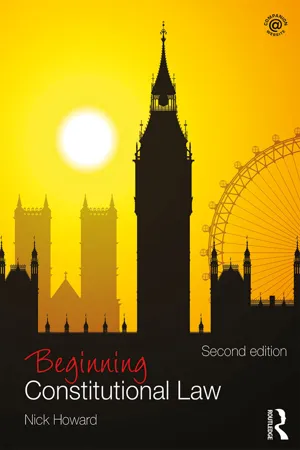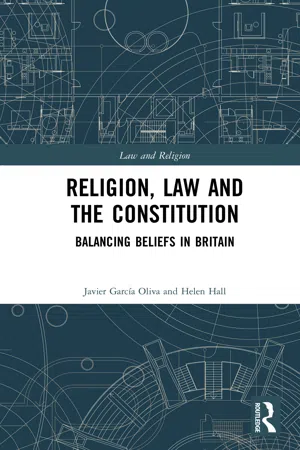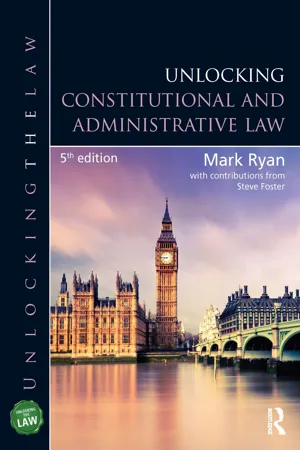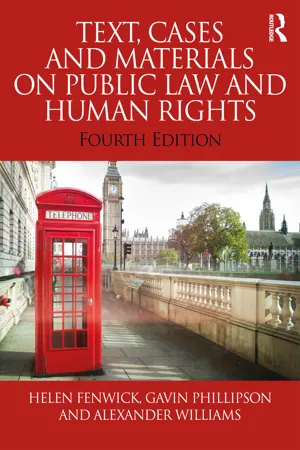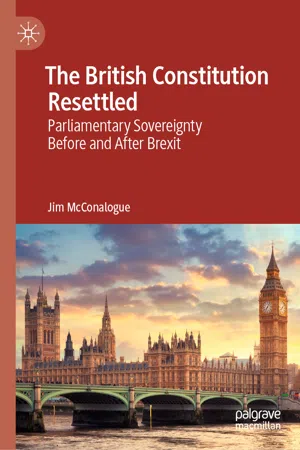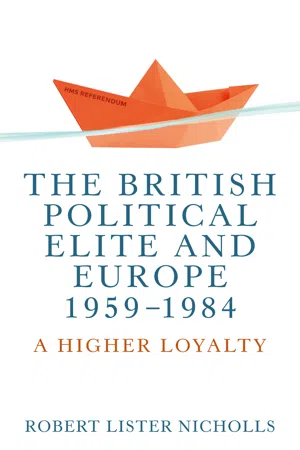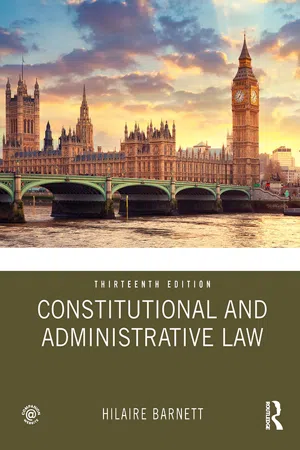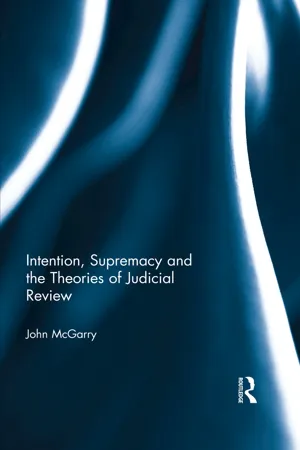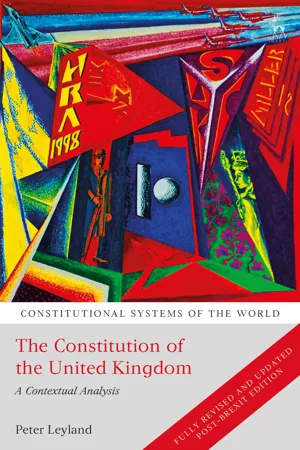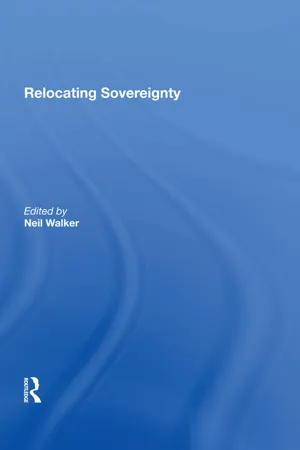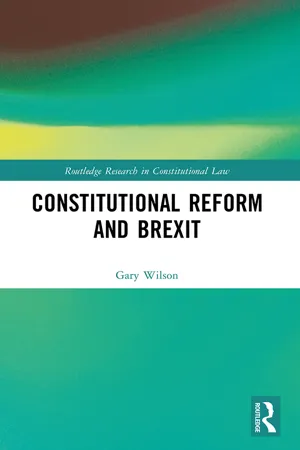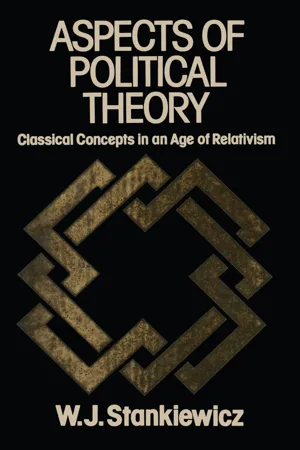Politics & International Relations
Parliamentary Sovereignty
Parliamentary sovereignty is a principle in the UK political system that asserts the supremacy of Parliament in making and unmaking laws. It means that Parliament has the ultimate legal authority and can enact, amend, or repeal any law. This concept also implies that no other body or institution can override or set aside legislation enacted by Parliament.
Written by Perlego with AI-assistance
Related key terms
Related key terms
1 of 4
Related key terms
1 of 3
12 Key excerpts on "Parliamentary Sovereignty"
- eBook - ePub
- Nick Howard(Author)
- 2016(Publication Date)
- Routledge(Publisher)
As with so much of constitutional law, it is important to be aware that Parliamentary Sovereignty has both legal and political meanings. While as lawyers, we are primarily concerned with Parliamentary Sovereignty as a legal rule, you will see throughout this chapter that the case law and jurisprudence from which the rule derives cannot be isolated from its political context. In order to write a good essay on this topic, you therefore need to be able to discuss Parliamentary Sovereignty from both a legal and a political perspective.Legally, Parliamentary Sovereignty describes the relationship between the legislature and the judiciary, which has traditionally been one in which the UK’s courts recognise Parliament as the supreme law-maker and unquestioningly apply its Acts (though, as we will see below, there are signs that this relationship may be changing).Politically, sovereignty has different shades of meaning. It refers partly to the independence of the UK from other nation States, and its ability to determine its own economic, political and legal affairs without foreign interference. But it also refers to the idea that, in a democracy, ultimate sovereignty resides with the electorate, on whose votes MPs depend for office and on whose co-operation they depend for the effectiveness of the laws they enact. - eBook - ePub
Religion, Law and the Constitution
Balancing Beliefs in Britain
- Javier García Oliva, Helen Hall(Authors)
- 2017(Publication Date)
- Routledge(Publisher)
p.225 5 Parliamentary supremacy and the religious character of the Constitution and the wider legal framework 5.1 IntroductionHaving examined the rule of law, we now move on to another key facet of the Constitution, namely the concept of Parliamentary Sovereignty. Unlike the rule of law, which is arguably an abstract idea applied by various organs and representatives of the state, Parliamentary Sovereignty is tied to a specific institution with a collective voice. Strikingly, the United Kingdom Parliament1 itself makes the following declaration about this principle, via its explanatory website:Parliamentary Sovereignty is a principle of the UK constitution. It makes Parliament the supreme legal authority in the UK, which can create or end any law. Generally, the courts cannot overrule its legislation and no Parliament can pass laws that future Parliaments cannot change. Parliamentary Sovereignty is the most important part of the UK constitution.2As we have already established in our discussion of the rule of law, the closing sentence is by no means uncontroversial. If Parliamentary Sovereignty really were the unquestioned king of the jungle in relation to constitutional principles, then Parliament would be entirely free to repeal any inconvenient legislation guaranteeing human rights and other safeguards, withdraw from international frameworks such as the Council of Europe, and rampage about gobbling up whatever rights and freedoms of citizens it desired.Nevertheless, even though its asserted dominance over all other principles should be treated with caution, Parliamentary Sovereignty is undoubtedly one of the essential pillars of the UK Constitution. At one level, it can be seen as a manifestation of the idea that the destiny of the state should be determined by the collective will of the people, as expressed through the democratic process, and once again we are left with the question of whether the current balance of Church/state relations and the wider approach of the legal system towards religion enhance the functioning of this principle. The following discussion is structured along the same lines as the previous chapter. First, we consider in detail what the label of Parliamentary Sovereignty truly encapsulates before going on to assess whether the current legal arrangements in respect of religion are conducive towards advancing this ideal. This will be followed by a consideration, similar to that undertaken in respect of the rule of law, about the doctrines of faith groups considered and the manner in which they might influence thought in relation to this constitutional foundation. We close the chapter with some discussion of the contribution of religious bodies, in practical terms, to the principle of parliamentary supremacy. - eBook - ePub
- Mark Ryan, Steve Foster(Authors)
- 2023(Publication Date)
- Routledge(Publisher)
section 5.7.2 ). Finally, although the principle of a legislature with the legal power to make any law that it chooses is very unusual, it is not unique. New Zealand also has an uncodified constitution, which comprises a Parliament (a unicameral legislature called the House of Representatives) which possesses the constitutional characteristic of sovereignty. As in the United Kingdom, it too is able to pass any law that it chooses.7.2 Terminology
The term Parliamentary Sovereignty (which denotes that the Queen in Parliament has unlimited legislative power) is arguably apt to mislead, because the term ‘sovereignty’ can have another meaning. Sovereignty is also used in the context of international law, relations and politics to indicate that a state is independent and sovereign (for example, France or Italy). As a consequence, a number of legal academics prefer to use the term ‘the legislative supremacy of Parliament’. Notwithstanding this, as Parliamentary Sovereignty (at least in historic terms) is closely associated with Dicey, and as he used this term, this book will do likewise. This should not be problematic providing we understand the sense in which the term is being used, namely to denote the legal and constitutional principle that Parliament can in theory pass any law that it chooses.As indicated earlier, Dicey argued that the constitution was founded on the following twin pillars:- The rule of law and
- Parliamentary Sovereignty.
- Legal sovereignty and
- Political sovereignty.
7.2.1 Legal sovereignty
In essence, legal sovereignty is concerned with the legislative power of the Queen in Parliament (the principle that any legislation can be made on any subject). Legal sovereignty is concerned with the constitutional relationship between the courts and the legislature (hence it is therefore necessarily an issue of constitutional significance). It is with legal sovereignty that this chapter is specifically concerned. Legal sovereignty relates to Bills which have been consented to (and therefore have become Acts of Parliament) by the following three constitutional elements: - Helen Fenwick, Gavin Phillipson, Alexander Williams(Authors)
- 2020(Publication Date)
- Routledge(Publisher)
1 This chapter therefore considers how far traditional understandings of sovereignty can and should remain applicable today. It does so in three main sections: the nature of Parliamentary Sovereignty; possible legal limitations on sovereignty; and the question of whether Parliament is able in any way to entrench legislation, so as to make it impossible or more difficult for subsequent Parliaments to repeal any given Act. The next chapter will consider the impact of European Union law on the traditional doctrine of Parliamentary Sovereignty. The main concern will be the extent to which the legislative competence of Parliament has been restricted by the impact of EU law.The Nature of Parliamentary Sovereignty
The Basic Idea of Sovereignty
The notion of ‘Parliamentary Sovereignty’ or the ‘legislative supremacy of Parliament’, as it is sometimes termed, can be seen to have both political and legal aspects. Given that the dominant body in Parliament, the Commons, is democratically elected, the notion can be seen as representing a description of the democratic basis for legislation in the UK. As used by constitutional lawyers, however, it means something much more specific: ‘By the legislative supremacy of Parliament is meant that there are no legal limitations upon the legislative competence of Parliament.’2As AW Bradley has summed up the doctrine:The sovereignty of Parliament describes in formal terms the relationship which exists between the legislature and the courts. As analysed by Dicey, the Queen in Parliament (the legislature) has ‘the right to make or unmake any law whatever’ and no person or body outside the legislature ‘is recognised by the law of England as having a right to override or set aside the legislation of Parliament’ [AV Dicey, An Introduction to the Study of the Law of the Constitution, 10th edn (1959), p 40]. In other words, there are no legal limits to the legislative authority of Parliament. When that authority is exercised in the form of an Act of Parliament, no court or other body has power to hold such an Act to be void or invalid or in any respect lacking in legal effect.3Notes
1. It will be seen that two distinct notions emerge from the above quotations. The first is the lack of legal, as opposed to conventional or moral, constraints on Parliament. Lord Reid has expressed this idea thus:- eBook - ePub
The British Constitution Resettled
Parliamentary Sovereignty Before and After Brexit
- Jim McConalogue(Author)
- 2019(Publication Date)
- Palgrave Macmillan(Publisher)
steered by the people, but also a subsidiary role of the judiciary, and their elected government, in providing recognition to the rule. Such a model reaffirms the essential and elective nature of political institutions, including Parliament, acting through very ordinary political and legislative processes to determine its sovereignty.2.1 The Five Principles of the Meaning of Sovereignty
The meaning of sovereignty itself is important to unbundle before one can begin with the meaning of Parliamentary Sovereignty. If sovereignty could be generally conceived of as the continued supremacy to rule over a given territory, there are identifiable features of that sovereignty formula that have occupied a primacy within that concept. The five following concepts are fundamental to my unbundling of the concept of sovereignty. The narratives of sovereignty are found within a rich interweaving of its medieval and modern forms, usually to provide political stability and anchorage.Firstly, supremacy is central because what legal and political theorists such as Hart have attempted to identify is the ultimate rule, where assessing the ‘rule of recognition ’ will provide the criteria by which the validity of all other rules are judged. That ultimate rule expresses a rule of recognition providing the criteria by which the validity of other rules in the legal system are assessed (Hart 1997 , pp. 102–103). Supremacy, in a general sense, has simply meant “the state or condition of being superior to all others in authority, power, or status: the supremacy of the king” (Oxford English Dictionary 2017 ). Theories of sovereign authority have long rested upon the claims of supreme and absolute authority in the polity (Bartelson 2011 ).Secondly, specific priority in understanding sovereignty is also given to the meaning of government at the recognised helm. With reference to Henry de Bracton’s medieval constitutionalism, he essentially divided the total act of the Crown’s government asgubernaculumfrom the claims of fundamental law, jurisdictio (McIlwain 1947 , p. 86). That is, government is separated from law. As Vile argues, the limitations placed upon the Crown by subjecting him to a fundamental law which he did not himself make provided the basis for a legislative power which was independent of the will of the King. That went hand in hand with the idea of an executive power in the King, to ensure that the law was put into effect (Vile 1967 , p. 23). While the distinction made by McIlwain has often been thought of as less than convincing (Corwin 1941 , p. 535), it is the gubernaculum that is primary feature. It is the Crown’s helm of the ship of state, which steers, directs and controls that which is necessary for the governance of the realm. It is often overlooked that the proper classical concept of gubernātiō is “steering; direction, control” and most importantly, gubernaculum is seen as the “helm” of the ‘ship of state’ (Morwood 2005 )—it is raw political sovereignty. That ‘taking of the helm’ is often recognised as government being exercised by a given political actor or set of actors—be it the Crown, officials or governments—and irrespective of Hart’s - eBook - ePub
The British political elite and Europe, 1959-1984
A higher loyalty
- Bob Nicholls(Author)
- 2019(Publication Date)
- Manchester University Press(Publisher)
Generally, the courts cannot overrule its legislation and no Parliament can pass laws that future Parliaments cannot change. Parliamentary Sovereignty is the most important part of the UK constitution (www.parliament.uk, 2013). The issue for some members of the political elite in respect of Europe is that Britain's membership of the European Union is seen to undermine both national and Parliamentary Sovereignty. History of sovereignty To fully appreciate the context in which the term sovereignty is used, a consideration of the historical aspect of Britain's sovereignty is required. It is also necessary to ascertain the relevance of sovereignty, particularly in relation to Britain and Europe. The English political theorist and philosopher Thomas Hobbes considered sovereignty to be a means of preventing people reverting to a state of nature (Hobbes, [1651] 1991). For Hobbes, sovereignty was absolute and the holder was required to have complete authority with power being undivided. Hobbes ‘could not conceive of a mixed or balanced government; it was absolutism or anarchy, and preferably absolute monarchy’ (Aylmer, 1975 : 232). At the time of Prime Minister Harold Macmillan's application for entry into the Common Market in 1961, opponents stressed the ‘dangers to Britain's political independence, citing threats to the role of the Queen, the British legal system, and the supremacy of Parliament’ (Lieber, 1970 : 200). A comparison can therefore be made between Hobbes’ absolutism in the seventeenth century and the more recent conflicts between those who hold the British Parliament to be sovereign and those who consider that sovereignty can be pooled or shared with Europe. The concept of Parliamentary Sovereignty resulted from the outcome of the Revolution Settlement of 1689, being essentially a compromise, with ‘sovereignty not being held by the monarch alone, but within the King in parliament’ (Aiken and Henning, 1970 : 230) - eBook - ePub
- Hilaire Barnett(Author)
- 2019(Publication Date)
- Routledge(Publisher)
The classical definition of sovereignty, offered from a constitutional law rather than a jurisprudential perspective, is that of AV Dicey (1885). Dicey insisted that it was essential to separate the political from the legal and to recognise that, as matters stand, legal sovereignty remains with the United Kingdom Parliament, although there may be political restraints which effectively inhibit the exercise of those powers. On sovereignty, Dicey stated:The principle of Parliamentary Sovereignty means neither more nor less than this: namely, that Parliament thus defined has, under the English constitution, the right to make or unmake any law whatever; and, further, that no person or body is recognised by the law of England as having a right to override or set aside the legislation of Parliament.From this description can be deduced three basic rules:A law may, for our present purpose, be defined as ‘any rule which will be enforced by the courts’. The principle, then, of Parliamentary Sovereignty may, looked at from its positive side, be thus described: any Act of Parliament, or any part of an Act of Parliament, which makes a new law, or repeals or modifies an existing law, will be obeyed by the court. The same principle, looked at from its negative side, may be thus stated: there is no person or body of persons who can, under the English constitution, make rules which override or derogate from an Act of Parliament, or which (to express the same thing in other words) will be enforced by the courts in contravention of an Act of Parliament. [1885, page 39](a) Parliament is the supreme law-making body and may enact laws on any subject matter;(b) no Parliament may be bound by a predecessor or bind a successor;(c) no person or body – including a court of law – may question the validity of Parliament’s enactments.It is the correctness of this definition which must be tested and evaluated. Having considered the concept of sovereignty in theoretical terms, examination of the manner in which this is translated into a practical legal doctrine is required. Dicey’s description of sovereignty will provide the framework for discussion. - John McGarry(Author)
- 2016(Publication Date)
- Routledge(Publisher)
European Constitutional Law Review 379– ‘The Principle of Parliamentary Sovereignty in Legal, Constitutional, and Political Perspective’ in Jeffrey L Jowell, Dawn Oliver and Colm O’Cinneide (eds), The Changing Constitution (8th edn, OUP 2015)Forsyth C F, ‘Showing the Fly the Way Out of the Flybottle: The Value of Formalism and Conceptual Reasoning in Administrative Law’ [2007] Cambridge Law Journal 325– and Elliott M C, ‘The Legitimacy of Judicial Review’ [2003] Public Law 286Goldsworthy J, The Sovereignty of Parliament: History and Philosophy (OUP 1999)Gordon M, ‘The Conceptual Foundations of Parliamentary Sovereignty: Reconsidering Jennings and Wade’ [2009] Public Law 519Hart HLA, The Concept of Law (3rd edn, OUP 2012)Jowell J L, ‘Of Vires and Vacuums: The Constitutional Context of Judicial Review’ [1999] Public Law 448Lakin S, ‘Debunking the Idea of Parliamentary Sovereignty: The Controlling Factor of Legality in the British Constitution’ (2008) 28 Oxford Journal of Legal Studies 709Laws Sir John, ‘Is the High Court the Guardian of Fundamental Constitutional Rights?’ [1993] Public Law 59– ‘Law and Democracy’ [1995] Public Law- eBook - ePub
The Constitution of the United Kingdom
A Contextual Analysis
- Peter Leyland(Author)
- 2021(Publication Date)
- Hart Publishing(Publisher)
47 It should be apparent that a significant step in the direction of challenging sovereignty through court decisions would fundamentally change the balance of the constitution.Political Sovereignty: Elections, Referendums, and BrexitDicey argued that political sovereignty (as opposed to legal sovereignty, which rests with Parliament) lay with the electorate and it is therefore associated with representative and responsible government. Political sovereignty is based on the doctrine of the mandate. It means that manifesto policies are carried out by legislation passed by Parliament (we will be noting that the extension of franchise actually strengthened the power of government, not that of Parliament). However, the formidable powers to legislate without constitutional qualification allow a government with a popular mandate to make wide-ranging changes, including constitutional reforms. Thus, according to the Whitehall Model of executive dominance expounded by Birch, the government controls Parliament and not Parliament the government.48 Indeed, the term ‘elective dictatorship’ was used in a similar way by Lord Hailsham to explain how Parliamentary Sovereignty had turned into the sovereignty of the House of Commons, which in turn is dominated by the party machine in the hands of the Prime Minister (PM) and the civil service.49 However, it has already been observed in the introduction that a revised notion of popular sovereignty has been emerging as part of the contemporary constitution which relies on consulting the electorate through referendums (see Chapter 1 - eBook - ePub
- Neil Walker(Author)
- 2018(Publication Date)
- Routledge(Publisher)
Thoburn v Sunderland City Council, Laws LJ explicitly rejected the notion that, by virtue of the EU supremacy principle – which, according to the European Court of Justice, envisages a ‘permanent limitation of [member states’] sovereign rights, against which a subsequent unilateral act incompatible with the concept of the Community cannot prevail’60 – Parliament is incompetent to legislate for withdrawal from the EU.‘[T]here is nothing in the [European Communities Act 1972] which allows the [European] Court of Justice, or any other institutions of the EU, to touch or qualify the conditions of Parliament’s legislative supremacy in the United Kingdom. Not because the legislature chose not to allow it; because by our law it could not allow it … The British Parliament has not the authority to authorise any such thing. Being sovereign, it cannot abandon its sovereignty.’61However, although power is presently ascribed to Parliament to withdraw from the EU, this need not be regarded as an immovable fact. As Allan comments, ‘If … the Community ever came to replace the United Kingdom as the fundamental political entity to which the average or representative citizen owed his first and natural allegiance, the courts could be expected to reflect that in their interpretation of the doctrine of sovereignty’.62 This underscores the point that legislative authority is a dynamic phenomenon which cannot be understood in isolation from the political context within which it exists. Indeed, in the Thobum case, Laws LJ opined that, while Parliamentary Sovereignty cannot be changed externally, by operation of EU law, it can be modified internally, by the evolution of the common law: ‘The conditions of Parliament’s legislative supremacy in the United Kingdom necessarily remain in the United Kingdom’s hands … [T]he traditional doctrine has in my judgment been modified. It has been done by the common law, wholly consistently with constitutional principle.’63 Laws LJ concludes that, at present, the modification is rather modest, so that while the European Communities Act 1972 is immune from implied repeal, it is still vulnerable to express repeal.64 - eBook - ePub
- Gary Wilson(Author)
- 2023(Publication Date)
- Routledge(Publisher)
However, a core tenet of Parliamentary Sovereignty being the principle that Parliament may not bind its successors, the case remained that by repealing the European Communities Act 1972, Parliament could exercise its sovereignty to remove the legislative limitations imposed by EU membership. 53 In practice, the need to adjudicate tensions arising between domestic and European legislation whilst the UK was a member of the EU saw a significant shift in the exercise of power at a domestic level from Parliament to the Courts. 54 Certainly, case law such as that emanating from the Factortame litigation witnessed the Courts making pronouncements on the constitutional validity of statutory provisions by reference to superior legal norms – provisions of EU law – in a manner never beforehand seen, representing a landmark constitutional development. 55 Notwithstanding the focus of most attention on the impact of the UK’s membership of the EU, by the time of the 2016 referendum it is possible to detect four further significant developments which might be made in respect of possible shifts in understandings of the doctrine. The first, arguably representing a possible emboldening of Parliamentary Sovereignty, concerned a shift in the relationship between the power exercised respectively by Parliament and that exercised by government under the Royal Prerogative. The others respectively concern potential practical restrictions upon Parliamentary Sovereignty to have arisen vis-à-vis judicial acceptance of limitations to the doctrine of implied repeal; indications that Parliament has moved to acknowledge ‘manner and form’ restrictions upon the exercise of its sovereign legislative authority; and increased political restrictions upon Parliamentary Sovereignty. 49 Gordon, supra n.41, p.214. 50 Westlake, M., ‘The increasing inevitability of that referendum,’ in Outhwaite, W - eBook - ePub
Aspects of Political Theory
Classical Concepts in an Age of Relativism
- W.J. Stankiewicz(Author)
- 2020(Publication Date)
- Routledge(Publisher)
Chapter IVSovereignty in Political Theory
Sovereignty has many meanings in political theory.1 The principal traditional division in meaning—and therefore an essential issue in political theory—has been that of political versus legal sovereignty. The main characteristic of legal sovereignty is that it takes law—which is in fact a part of the concept of sovereignty and a consequence of a system of sovereignty—and attempts to make it the system itself; it imposes itself upon the community and somehow ‘gathers’ the power to do so during the process. The concept of legal sovereignty suffers the defect of presupposing a basic stability in social relations—a stability that would make the very concept of sovereignty unnecessary. Legal sovereignty has become closely linked with the ‘democratic’ view of sovereignty, even though its requirements are such that ‘democracy’ becomes essentially a description of a ceremonious induction of a government into office at more or less regular intervals.The Nature of Sovereignty
Classical, political ‘Hobbesian’ sovereignty, unlike its legal counterpart, does not assume that in order to have its essential characteristics authority must be imposed. In this respect, political sovereignty fulfills the requirements of democratic theory, but it differs from the latter in an important way: it recognizes that life in society requires a set of norms that cannot be assumed to be a part of man’s nature—the laws of society can never simply reflect the will of the people, no matter what may be the form of government. Ultimately, a good part of the authority of the Hobbesian sovereign rests upon the individual’s recognition that his (the individual’s) impulses and interests are not social in any meaningful sense but private (even when he is sociable and gregarious) and that to require him to take an interest in the kind of decisions necessary is unreasonable, even if one can assume he has the qualities necessary for making ‘right’ decisions. Hobbesian sovereignty creates the conditions which are needed for such an interest to exist. Democratic theory, attempting to assign ultimate authority to the ‘people’, has not been able to overcome the problem of public and private norms. In order to mediate between the two sets of norms, it is inclined to adopt legal sovereignty which means abandoning the norms of individuality for the norms of the ‘constitution’ and insisting that everyone adapt his behaviour to a static conception of society while living in one that is unmistakably changing.
Index pages curate the most relevant extracts from our library of academic textbooks. They’ve been created using an in-house natural language model (NLM), each adding context and meaning to key research topics.
Explore more topic indexes
Explore more topic indexes
1 of 6
Explore more topic indexes
1 of 4
